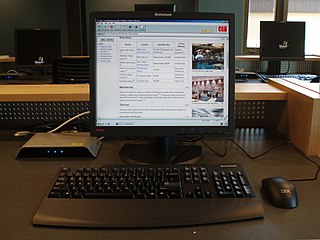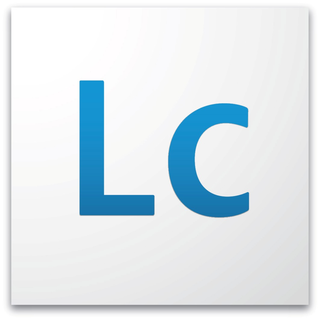
In computer networking, a thin client is a simple (low-performance) computer that has been optimized for establishing a remote connection with a server-based computing environment. They are sometimes known as network computers, or in their simplest form as zero clients. The server does most of the work, which can include launching software programs, performing calculations, and storing data. This contrasts with a rich client or a conventional personal computer; the former is also intended for working in a client–server model but has significant local processing power, while the latter aims to perform its function mostly locally.
HCL Notes and HCL Domino are the client and server, respectively, of a collaborative client-server software platform formerly sold by IBM, now by HCL Technologies.

Esri is an American multinational geographic information system (GIS) software company. It is best known for its ArcGIS products. With a 43% market share, Esri is the world's leading supplier of GIS software, web GIS and geodatabase management applications. The company is headquartered in Redlands, California.
NewTek, Inc. is a San Antonio, Texas–based hardware and software company that produces live and post-production video tools and visual imaging software for personal computers. The company was founded in 1985 in Topeka, Kansas, United States, by Tim Jenison and Paul Montgomery. On April 1, 2019, it was announced that NewTek would be acquired by Vizrt.
An application program is a computer program designed to carry out a specific task other than one relating to the operation of the computer itself, typically to be used by end-users. Word processors, media players, and accounting software are examples. The collective noun "application software" refers to all applications collectively. The other principal classifications of software are system software, relating to the operation of the computer, and utility software ("utilities").
Quantum Corporation is a data storage, management, and protection company that provides technology to store, manage, archive, and protect video and unstructured data throughout the data lifecycle. Their products are used by enterprises, media and entertainment companies, government agencies, big data companies, and life science organizations. Quantum is headquartered in San Jose, California and has offices around the world, supporting customers globally in addition to working with a network of distributors, VARs, DMRs, OEMs and other suppliers.
Remote Desktop Protocol (RDP) is a proprietary protocol developed by Microsoft Corporation which provides a user with a graphical interface to connect to another computer over a network connection. The user employs RDP client software for this purpose, while the other computer must run RDP server software.

SUSE Linux Enterprise is a Linux-based operating system developed by SUSE. It is available in two editions, suffixed with Server (SLES) for servers and mainframes, and Desktop (SLED) for workstations and desktop computers. Its major versions are released at an interval of 3–4 years, while minor versions are released about every 12 months. SUSE Linux Enterprise products receive more intense testing than the upstream openSUSE community product, with the intention that only mature, stable versions of the included components will make it through to the released enterprise product.

ArcGIS is a family of client, server and online geographic information system (GIS) software developed and maintained by Esri. ArcGIS was first released in 1999 and originally was released as ARC/INFO, a command line based GIS system for manipulating data. ARC/INFO was later merged into ArcGIS Desktop, which was eventually superseded by ArcGIS Pro in 2015. ArcGIS Pro works in 2D and 3D for cartography and visualization, and includes machine learning (ML).
A client access license (CAL) is a commercial software license that allows client computers to use server software services. Most commercial desktop apps are licensed so that payment is required for each installation, but some server products can be licensed so that payment is required for each device or user that accesses the service provided by the software. For example, an instance of Windows Server 2016 for which ten User CALs are purchased allows 10 distinct users to access the server.

Adobe LiveCycle Enterprise Suite (ES4) is a service-oriented architecture Java EE server software product from Adobe Systems used to build applications that automate a broad range of business processes for enterprises and government agencies. LiveCycle ES4 is an enterprise document and form platform that allows capturing and processing information, delivering personalized communications, and protecting and tracking sensitive information. It is used for purposes such as account opening, services, and benefits enrollment, correspondence management, requests for proposal processes, and other manual-based workflows. LiveCycle ES4 incorporates new features with a particular focus on mobile devices. LiveCycle applications also function in both online and offline environments. These capabilities are enabled through the use of Adobe Reader, HTML/PhoneGap, and Flash Player clients to reach desktop computers and mobile devices.
SUSE Linux is a computer operating system developed by SUSE. It is built on top of the free and open source Linux kernel and is distributed with system and application software from other open source projects. SUSE Linux is of German origin, its name being an acronym of "Software und System-Entwicklung", and it was mainly developed in Europe. The first version appeared in early 1994, making SUSE one of the oldest existing commercial distributions. It is known for its YaST configuration tool.
Nuxeo is a software company making an open source content management system.
StorNext File System (SNFS), colloquially referred to as StorNext is a shared disk file system made by Quantum Corporation. StorNext enables multiple Windows, Linux and Apple workstations to access shared block storage over a Fibre Channel network. With the StorNext file system installed, these computers can read and write to the same storage volume at the same time enabling what is known as a "file-locking SAN." StorNext is used in environments where large files must be shared, and accessed simultaneously by users without network delays, or where a file must be available for access by multiple readers starting at different times. Common use cases include multiple video editor environments in feature film, television and general video post production.
PTC IntegrityLifecycle Manager is a software system lifecycle management (SSLM) and application lifecycle management (ALM) platform developed by MKS Inc. and was first released in 2001. The software is client/server, with both desktop (java/swing) and web client interfaces. It provides software development organizations with a collaborative environment in which they can manage the end-to-end processes of development, from requirements management, engineering change management, revision control, and build management to test management and software deployment, as well as associated reports and metrics.
XenClient is a discontinued desktop virtualization product developed by Citrix that runs virtual desktops on endpoint devices. The product reached end of-life in December 2016. Desktops are run locally, without hosting applications or the operating system in a datacenter. It consists of a Type-1 Xen client hypervisor and a management server, which provides features such as centralized provisioning, patching, updating, monitoring, policy controls, and de-provisioning. It enforces security through features including AES-256 full disk encryption, VM isolation, remote kill, lockout, USB filtering, and VLAN tagging. XenClient supports use cases such as disconnected operation on laptops, limited connectivity environments, and other use cases where use of local execution is desired and centralized management is required.
Wanova, Inc, headquartered in San Jose, California, provides software to help IT organizations manage, support and protect data on desktop and laptop computers. Wanova's primary product, Wanova Mirage, was designed as an alternative to server-hosted desktop virtualization technologies.

censhare is a commercial Digital Experience Platform in the form of an Enterprise Content Management System (ECMS) by the German software manufacturer censhare GmbH. It integrates all of the entered media information in a single system, organizes content and automates the respective processes. The platform integrates the applications Collaboration and Process Management, Digital Asset Management, Product Information Management, Omnichannel Content Management, Brand Management and Marketing Resource Management. censhare is an Editorial System as well as a Web Content Management System. It can be used for cross-media publishing of content in different media such as Multi Format Publishing, Cross-Media Publishing and Multi Channel Publishing. The system is used in media houses and other companies and institutions for the generation and output of content in conventional, standard communication media, as well as for corporate communication, marketing, brand management, multichannel marketing, the processing of sales publications and for collaboration. On a technical level the content, templates, layouts, structures and user accounts are stored and managed separately in a central graph database.

Lookeen is an enterprise search and desktop search product released in 2008 by Axonic Informationssysteme GmbH.







